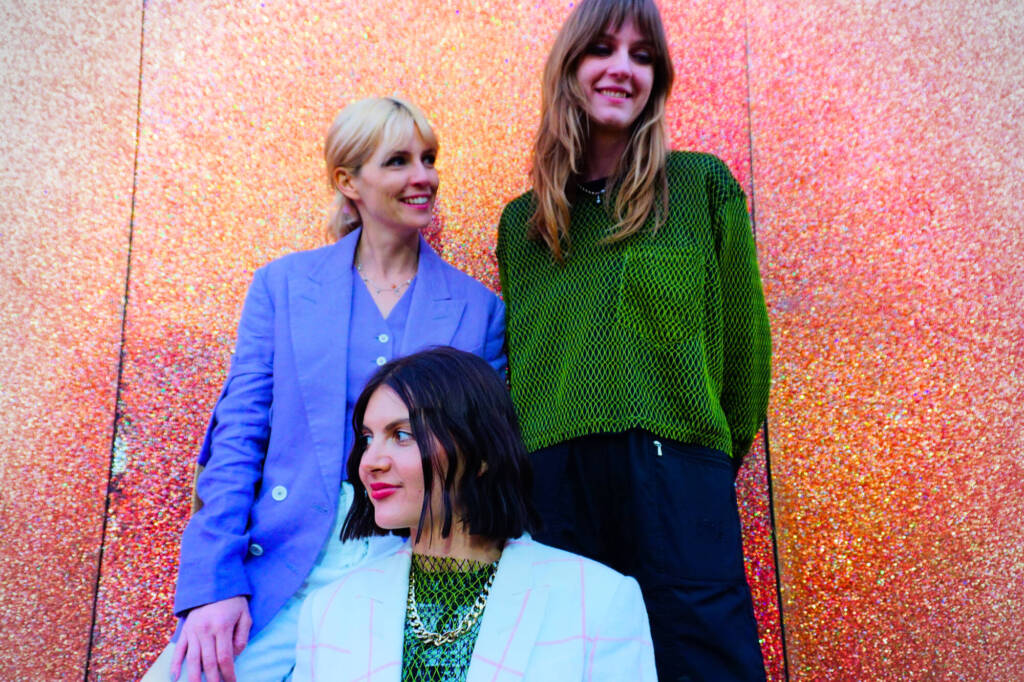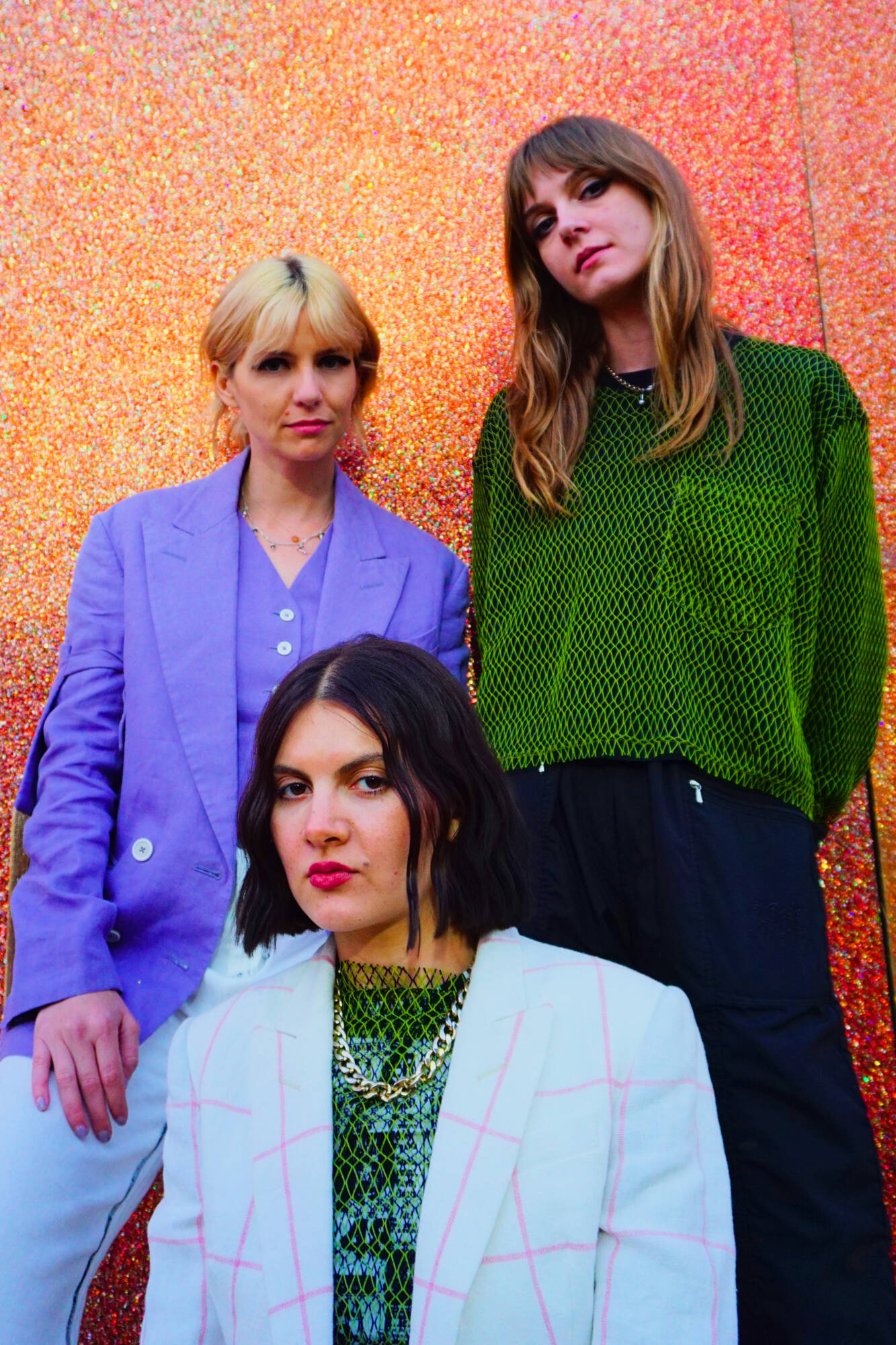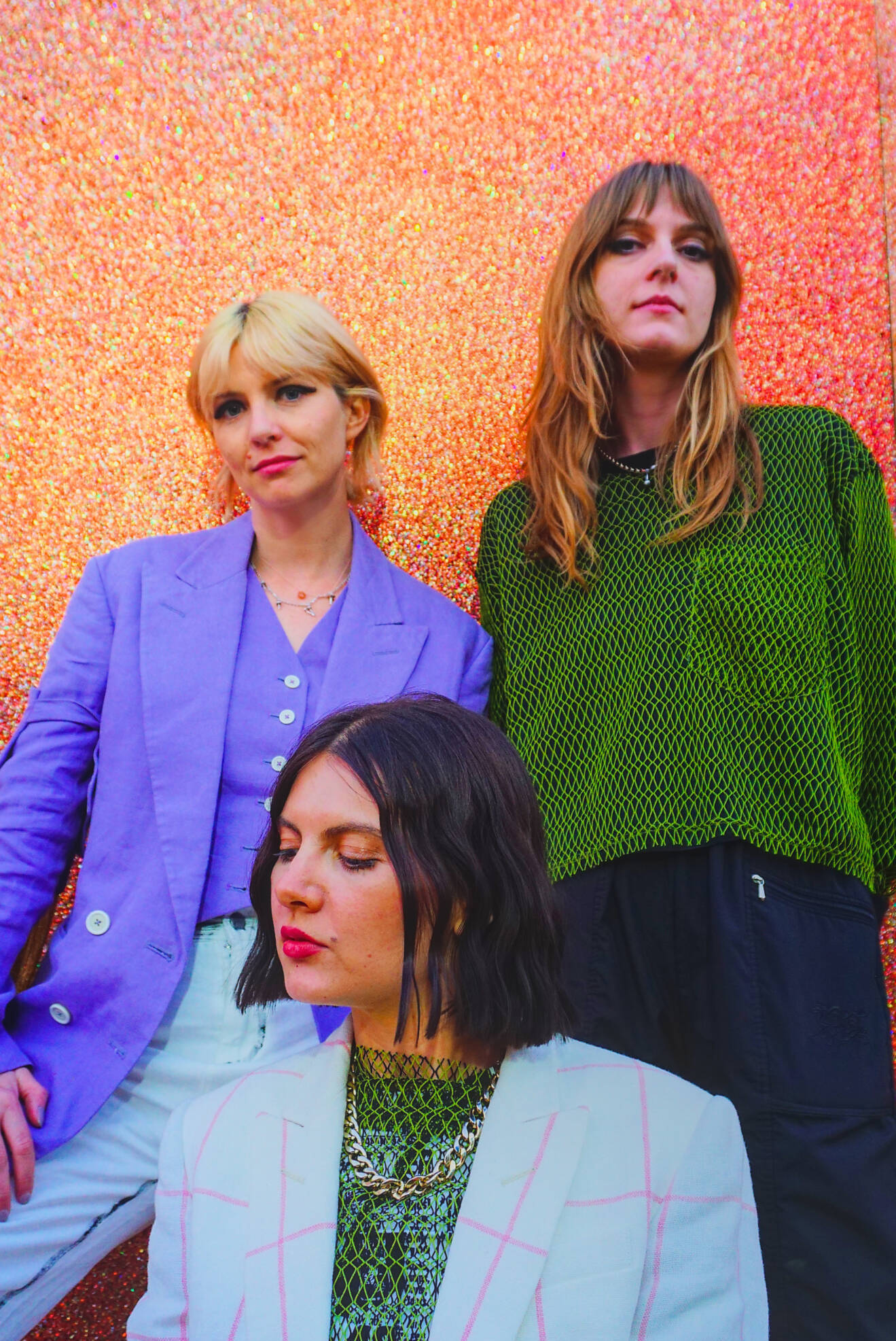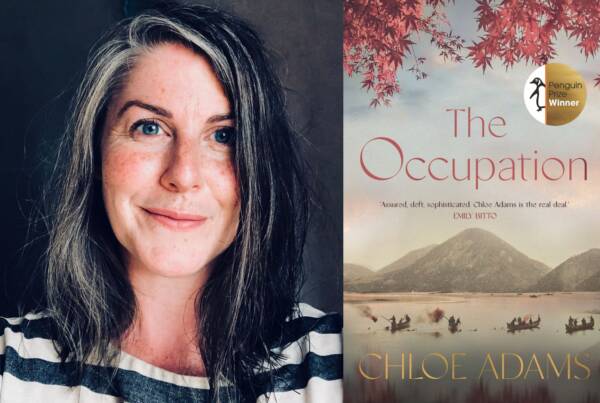Words and Photographs by Erandhi Mendis
“We were a bunch of slackers,” Izzy Glaudini laughs when I ask what the trio were doing immediately prior to starting the LA synth-pop outfit Automatic.
It doesn’t track, as the band’s work ethic since forming in 2017 feels somewhat relentless in the best way possible. She is of course, referencing the hustle of humble beginnings – all too common for artists breaking onto the scene. Bassist and drummer respectively, Halle Saxon and Lola Dompé chime in with stories about cleaning houses, working at a farmers market (subsequently getting fired) and doing auditions for commercials before they formed a band.
They’re a mile away from that now, sitting next to a fire (that for some reason was unlit) in the Southern Hemisphere where they’ve just gotten off stage at one of Australia’s biggest music festivals, Splendour In The Grass. It’s not the first time they’ve been Down Under, with the band touring earlier in the year and now returning for a string of support shows with the Yeah Yeah Yeahs.
“It’s been interesting to come back to Australia and see the colder months because the last time we were here it was summer,” Saxon says as we huddle next to the aforementioned unlit fire backstage.
It’s nice seeing international artists make the trek out to Australia for festival season, and even nicer to see a warm reception from the crowd when the band takes the stage in the GW McLennan tent.
Automatic perform a tight, cohesive set that despite the broad daylight, makes it feel like I am in a basement of a French club at 2am – perfect. It reminds me that we don’t see enough post-punk synth acts this side of the equator very often. The affliction of our part of the world leaning so far into indie acoustic forward music is that the industry sometimes forgets the power of a paraphonic analog synthesizer paired with a thumping bassline.
Of course, in the same way loose fitting low rise pants are back – music is similarly cyclical. The late 70s post punk scene saw artists creating sonic vistas to escape complex economic and political climates. Though we seem to be looping back around to a sense of escapism, Glaudini believes the connection between music to political shifts has never truly left.
“Donald Trump obviously brought about the darkness [sonically] you know, and before that it was like oh Obama, everything’s happy. It really brought that indie scene to the front. And as you go back, like Margaret Thatcher, the 70s – you know that punk scene really solidified in my mind that music is always tied to all the political shit going on.”
“And it is cyclical, like I was just talking about Devo and how they have similar ideas to us – we could literally be Devo today and it would still hurt,” says Saxon, referencing the American new wave art punk rockers who have a trademark for satirical social commentary within their music.
While change is intangible and often laboured, in some ways the sonic cohesion of Automatic is a tribute to the progress achieved by post-punk female artists over the last half-century. By fearlessly claiming space and rejecting industry tropes, the band have contributed to a more inclusive and diverse music space. It is refreshing to meet a band like Automatic, so steadfast in their awareness of industry discourse and the wider bureaucracy of being 21st century musicians – sometimes you play the game simply to play your music.
“We get called ‘girl band,’ a lot. I will say it’s gotten noticeably better, but sometimes when we are touring dudes will look for the closest man to ask a question about our stuff.”
 They all collectively laugh and then quickly sigh at this notion, obviously commonplace in a touring cycle. When I mention the notion of the gender pay gap (a big discussion in the Australian market) they agree that it is not talked about enough within the industry as a whole. There is an oscillating scale for artists that forces emotions to swing between gratitude, acceptance and fervour for growth. It is concerning to me that female musicians are expected to be thankful simply for being invited to the table.
They all collectively laugh and then quickly sigh at this notion, obviously commonplace in a touring cycle. When I mention the notion of the gender pay gap (a big discussion in the Australian market) they agree that it is not talked about enough within the industry as a whole. There is an oscillating scale for artists that forces emotions to swing between gratitude, acceptance and fervour for growth. It is concerning to me that female musicians are expected to be thankful simply for being invited to the table.
“You know, I think it doesn’t get spoken about as much but we do notice when we get asked to do opening slots where we probably shouldn’t be. But more than that I think we probably just get criticised for things that male bands don’t,” says Saxon.
Dompé quickly agrees – “like movement on stage,” with Glaudini adding the common assessment of “they’re not smiling enough. Smile! Why aren’t you happy here? People are so critical of energy on stage. If you’re a girl you have to bring it in this whole other way.”
This instantly harkens to the golden handcuffs of mainstream pop success – how most male touring artists have incredibly stripped back stage production whereas artists such as Beyonce or Taylor Swift have hours worth of costuming, pyrotechnics and choreography. Forgetting the argument that they enjoy their craft, it would surely shock the world if the Renaissance tour was simply Beyonce alone on stage for two hours.
“I wish our male counterparts understood that we come in peace and are just trying to do our jobs,” says Glaudini of the complex environment touring can bring when working in a particularly male dominated territory. It makes sense – particularly given the lack of female representation in crew and sound positions. I reflect on my time at school and the way the sound production classes were monopolised by men. Perhaps as the industry supports and champions more women into crew roles, our female artists are more likely to have a less polarising experience.
In the same vein, where change can be a prolonged, thankless journey – Automatic are not waiting for anyone to make the world better. It is obvious they entrust themselves as the custodians of their career trajectories, experiences and challenges. One of which – is avoiding being a machine spitting out love songs. I raise this and the three of them, so in sync, almost finish each other’s sentences discussing why.
“David Byrne says he writes love songs to lamps and couches,” laughs Saxon. “We wanted to challenge ourselves creatively and we write together really collaboratively. You know we all have love problems – and there’s also enough love songs out there.”
“There’s a lot of the Lana Del Rey effect. The dude that the woman is always singing about, sucks. Why are you wasting lyrics on a dude that sucks,” says Glaudini.
It’s tongue in cheek but it makes me think about how the female experience is often framed by attention from men and that creatively we often are rewarded for sharing within the realm of whatever the opposite is of the Bechdel test. Perhaps feminine pain and angst over men is a relatable toil, but it also ensnares our gender within confined boundaries. Why would a woman write about anything other than a man?
“It’s empowering sure, but it’s also empowering to not give energy to like your little heartbreak. Like there are bigger things at play. It’s refreshing to not focus on that and to not be always associating ourselves with men always.”
Glaudini continues – “it helps me when I’m fucked up over a guy to not even think about that person. You know? Use your brain!”
It’s captivating to hear three brilliant female musicians speak candidly about making art that centres themselves as the protagonists making nary a reference to the trials and tribulations of loving someone else. They are human though, and love songs will always have a place in their lives – just for now, it seems far away from their creative process for good reason.
The three of them laugh before Saxon and Dompé chime in like twins, “nah, we love that shit too – we definitely indulge.”
—
Keep up with Automatic








